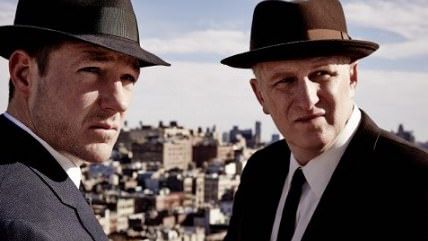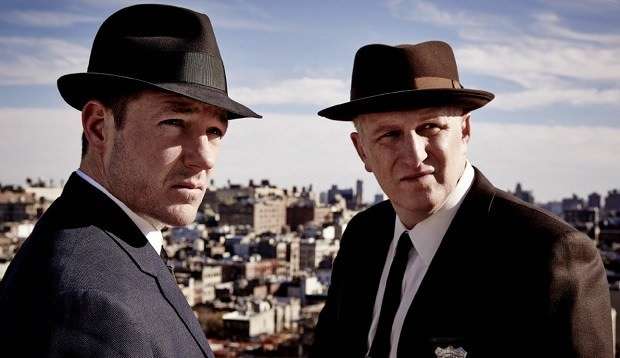Public Morals Approaches Vice Squad Drama with Authenticity in Mind
Ed Burns' new TNT show avoids Hollywood-style excesses.


On his first day as a plainclothesman, ambitious but naive young cop Jimmy Shea gets an explanation from his new commander about New York City vice squad's exalted role in the metropolitan justice system: "Our job is to curb all kinds of vice. That includes prostitution, pornography, degeneracy and the blue laws."
That's followed by a second, more candid, briefing by another senior officer, who elaborates: "Nobody wants these laws enforced. We do what has been done for the last 100 years—we manage it for the city. Think of us as the landlords. And if you want to be in business, you have to pay your rent."
As Shea soon discovers, that's a pleasantly euphemistic description of a leviathan extortion racket in which the cops extract money, sexual favors and political clout from favored gamblers and hookers while administering broken noses and jail time to the rest.
This is neither a grand jury report on police corruption nor a lost chapter of Defending The Undefendable. It's the seamy, violent and enticing world of TNT's utterly riveting new 1960s cop drama Public Morals, a world so different than the one Hollywood usually shows you—think of the rampaging redneck sheriff Buford Pusser busting up moonshine stills and dice games in the Walking Tall movies—that you almost expect Rod Serling to step out from behind a bush, warning that "you're traveling through another dimension… ."
If Public Morals (the title refers to the formal name of New York's vice squad) has more of a real-world ring to it than the usual Untouchables-style paean to the eternal struggle to keep us safe from victimless crime, that's because indy filmmaker Ed Burns, the show's creator and star, built its narratives from stories he heard from cop relatives growing up.
The authenticity ripples through every facet of Public Morals, particularly the fractured psyches of the cops whose lives are layered in multiple levels of deception. From the personal (the married cops must juggle their secret lives of graft and hookers with suspicious wives) to professional (every new cop detailed to the squad, including Jimmy Shea, is a potential rat until proven otherwise), their bond is their paranoia.
It's exacerbated by the times. Like the summer's other new cop show, NBC's Aquarius, Public Morals is set in the 1960s and shares its view of the decade as one of turbulence and agitation rather than peace and love. Much of the action plays out on opposite sides of a yawning generation gap that runs through cops and mobsters alike.
The older gangsters are nervous about a rising generation with outsized ambitions and quick trigger fingers, while the police sense they are on the wrong side of a culture war with younger officers that's so profound they lack the vocabulary even to describe it. "He's everything that's wrong with too many of these young cops nowadays," one veteran sniffs of a new arrival. "The kid went to college, for chrissakes. He lives in the suburbs."
Each of Burns' characters is intricately crafted, none better than the one he plays, Sgt. Terry Muldoon. The squad's street leader, Muldoon's surface tranquility masks a roiling sea of domestic crises: His uncle is an erratic gangster; his teenage kid seems more interested in being a mob princeling than a third-generation cop; and his impatient wife wants to know why then can't move out of the decaying Hell's Kitchen neighborhood where he grew up. As a mob war simmers on the squad's turf, Muldoon faces eruptions on all sides.
Muldoon presides over a loyal but increasingly unstable crew that includes Michael Rappaport (Justified) as a dedicated family man who has fallen under the sway of a gorgeous high-end call girl; Wass Stevens (House of Cards) as a veteran officer whose querulous wife knows way too much about the squad's activities; Austin Stowell (Whiplash) as a handsome hothead who's blissfully unaware of the risk in his romance with a New York Times wannabe journalism student (Lyndon Smith, 90210); and Patrick Murney (Person of Interest) as an amiable young cop for whom the squad is one long, bra-snapping party.
Then there's the squad's newest member, Jimmy Shea (newcomer Brian Wiles). Is he really just a college-boy naif, or is he pursuing a secret agenda? "Be smart out there, son," one apprehensive older officer counsels him. "But not too smart." His words sound like they're coming from the bottom of a well.
Public Morals. TNT. Tuesday, August 25, 10 p.m. EDT.
